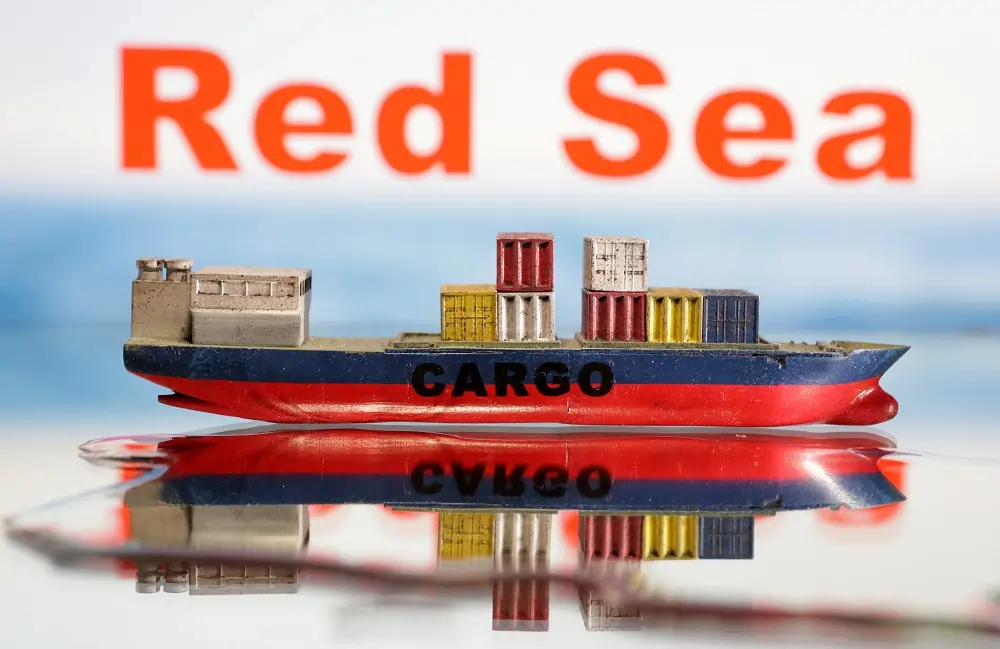
Red Sea trade disruption hits energy sector after strikes on Houthis
By Andrew Mills and Robert Harvey
DOHA/LONDON (Reuters) -Qatar suspended liquefied natural gas (LNG) shipments via the Red Sea and six more oil tankers changed direction as disruption to the crucial trade route extended to the energy sector after U.S.-led strikes against Houthi militants.
Attacks on ships since October by Yemen’s Houthis, who say they are acting in solidarity with Palestinians, have hit commerce and alarmed major powers in a regional escalation of Israel’s more than three-month war with Hamas militants in Gaza.
In the latest apparent attack, a U.S.-owned bulk carrier was reportedly struck by a missile near Yemen’s port of Aden, causing a fire in a hold but no injuries on board, according to British Maritime Security firm Ambrey.
That could mark a widening of targets for the Houthis, who have previously said they will only target Israeli ships or those en route to Israel.
In response to the instability, the world’s second largest LNG exporter QatarEnergy has now held back at least four gas tankers from the Red Sea, a senior source said.
At least six more oil tankers were also steering clear on Monday, making 15 since last week’s Western strikes in Yemen, according to tracking data. Prior to that, it was mostly container ships avoiding the area in fallout from the Gaza war.
The Houthis have been at war with a Saudi-led coalition in Yemen for years, but turned their sights on the sea as a way to put pressure on Israel after the Gaza war began.
In the latest Western military action in the region, the United States said late on Sunday that its fighter aircraft shot down an anti-ship cruise missile fired by the militants toward a U.S. destroyer. No injuries or damage were reported, it said on X.
SUPPLIES AFFECTED
An explosion was heard on Monday near Yemen’s Hodeidah airport, residents reported.
With some supply lines affected by the instability, carmaker Suzuki said production would be halted at its Esztergom plant in Hungary from Jan. 15-21 as the Red Sea attacks had delayed the arrival of Japanese-made engines.
The Houthis have vowed to keep targeting Israel-linked ships and to give a firm response to the attacks on them.
U.S. ally Britain said it had no desire to be involved in Red Sea conflict but was committed to protecting free navigation. “Let’s wait and see what happens,” Defence Secretary Grant Shapps told Sky News regarding potential further strikes.
China, too, is worried about the implications for its major commercial interests along the Suez Canal.
LSEG shiptracking data showed that Qatar’s Al Ghariya, Al Huwaila and Al Nuaman vessels had loaded LNG at Ras Laffan and were heading to the Suez Canal before stopping off in Oman on Jan. 14. The Al Rekayyat, which was sailing back to Qatar, stopped along its route on Jan. 13 in the Red Sea.
“It is a pause to get security advice, if passing (through the) Red Sea remains unsafe we will go via the Cape,” the source told Reuters on Monday regarding QatarEnergy.
The longer route round Africa’s Cape of Good Hope, which various shipping firms have opted for, can add about nine days to the normally 18-day trip from Qatar to northwest Europe.
The Qatari government and QatarEnergy did not immediately respond to requests for comment.
The Red Sea is linked to the Mediterranean by the Suez Canal, creating the shortest shipping route between Europe and Asia, and is connected to the Gulf of Aden by the Bab al-Mandab strait between Yemen and Djibouti.
About 12% of world shipping traffic transits the canal.
Front-month European benchmark gas prices on the Dutch TTF hub were down 1.94 euros at 29.66 euros per megawatt hour (MWh) in afternoon trade on Monday, LSEG data showed.
Asia spot LNG prices fell to a seven-month low of $10.10 per million British thermal units (mmBtu) on Friday, supported by healthy storage levels in Europe and northeast Asia. [LNG/]
Oil prices lost more than 1% on Monday as the Middle East conflict’s limited impact on crude output prompted profit taking after oil benchmarks gained 2% last week. [O/R]
(Reporting by Maha El Dahan in Davos; Emily Chow in Singapore, Andrew Mills in Doha; Sachin Ravikumar, Elizabeth Piper, Robert Harvey, Natalie Grover, Ahmad Ghaddar and Jonathan Saul in London; Chandni Shah in Bengaluru; Writing by Andrew Cawthorne; Editing by Catherine Evans and Jason Neely)


